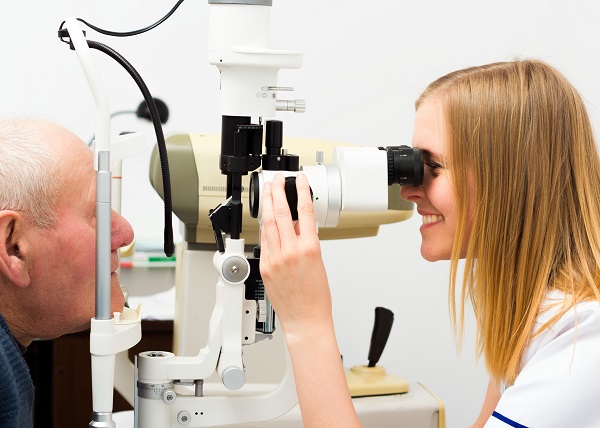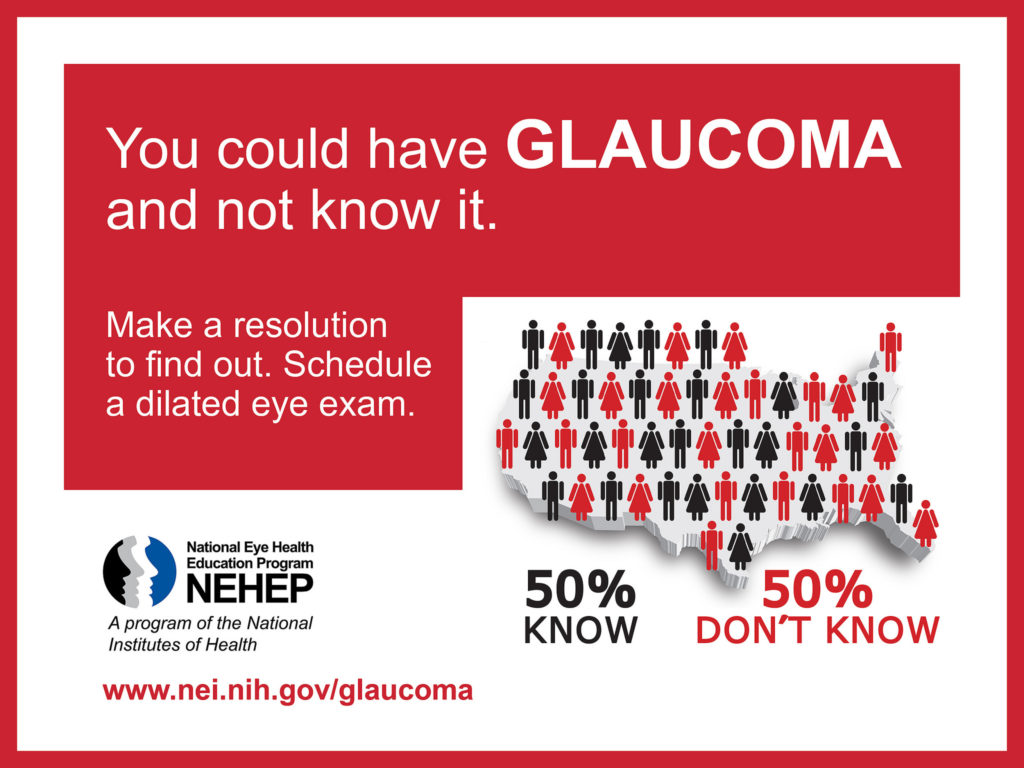
January is Glaucoma Awareness Month. Nearly 3 million people in the U.S. are living with glaucoma, an eye disease that causes damage to the optic nerve, resulting in loss of vision. While there is no cure for glaucoma, an early diagnosis, proper medical treatment, and a healthy lifestyle can slow the disease’s progress.
Glaucoma is a life-changing disease. But it doesn’t have to be a change for the worse. You may be surprised to learn that comedienne Whoopi Goldberg and U2 lead singer Bono have been diagnosed with glaucoma. It hasn’t slowed them down! Living with glaucoma means making strategic changes to your daily routine — developing new habits that will allow you to manage your health and maintain the independent lifestyle you’re accustomed to.
Glaucoma: What It Is and Who It Affects
Glaucoma is actually a group of eye diseases that often arise without symptoms. It primarily occurs in middle-aged and elderly people, but can affect you at any age. The condition damages the optic nerve, which can lead to vision loss without treatment.
You may have a higher risk of developing glaucoma if you:
- Are over 60 years old;
- Are of African, Asian, or Hispanic descent;
- Have a family history of glaucoma;
- Have certain medical conditions, such as diabetes;
- Use steroids;
- Have suffered an eye Injury;
- Have hypertension; or
- Have severe Myopia (nearsightedness)
While there is no cure for glaucoma, there are several treatment options. The earlier it’s caught, the better the chances of stopping the disease’s progress and saving your vision.

Healthy Habits You Need for Living with Glaucoma
Communicate with your healthcare providers, your family, and friends.
Schedule regular eye exams and take your medications. Communicate with your doctor. Let him know which medications you are taking for your glaucoma. Some of the drugs commonly prescribed for glaucoma don’t mix well with other drugs, like cortisone.
Medications should be taken exactly as prescribed by your doctor. Make them part of your daily routine, just as you do for brushing teeth and eating meals, to avoid missing a dose.
Explain your disease to your family and friends, and look for support groups specifically for patients with glaucoma. Emotional support is important to successfully coping with glaucoma.
Schedule an appointment with a Glaucoma Specialist to discuss Glaucoma Treatment options.
Maintain a healthy lifestyle through diet and exercise.
A healthy, well-balanced diet is a good for everyone and is especially beneficial when living with glaucoma. Your food should contain lots of antioxidants, vitamins A and D, zinc, carotenoids and omega 3 fatty acids — nutrients that can prevent further degeneration of the eyes and slow the progress of your disease.
Exercise helps lower eye pressure and gets blood flowing to the retina and optic nerve. Since some activities can increase the pressure on the optic nerve, you should consult with your optometrist before starting an exercise program.
Monitor your blood pressure closely. Low and high blood pressure can lead to further optic nerve damage.
Limit caffeine intake, and don’t smoke!
Adapt to changes in your vision.
In the home, you can install lights in the parts of your house that are too dark. Place on/off switches in convenient, easily accessible locations. Move any potential obstacles to a safe place.
Wear sunglasses for outdoor activities and goggles or safety glasses while playing sports or doing yard work.
If it’s too dark outside, use a bright flashlight.
Use careful judgment when it comes to driving. Your vision loss may have progressed to a point where you could pose a danger to yourself and others on the road.
Don’t be afraid to ask for help.
Frequently Asked Questions About Glaucoma
Are There Warning Signs That You May Have Glaucoma?
That’s one of the biggest problems with this eye disease. In many cases, there are no warning signs or symptoms in the early stages of the disease. Up to 40% of vision can be lost without a person noticing. The key to catching glaucoma in its early stages is to have regular comprehensive eye exams.
Symptoms of open angle glaucoma can include loss of peripheral vision, blind spots, and tunnel vision. The symptoms for closed angle glaucoma are much more serious and can include: eye pain, blurred vision, nausea, and redness of the eyes.
The symptoms for closed angle glaucoma can appear suddenly in what is called an “attack”; this is a medical emergency that requires immediate treatment.
Can Glaucoma Be Prevented?
We may not be able to prevent glaucoma, but there are steps you can take to detect the disease in its early stages, reduce its progress, and minimize loss of vision.
The most effective way to detect glaucoma in its earliest stages is through regular comprehensive eye exams.
To check for symptoms of glaucoma, your eye doctor will perform the following tests:
– Tonometry –measures the inner eye pressure
– Ophthalmoscopy – examines the shape and color of the optic nerve
– Perimetry –determines a patient’s complete field of vision
– Gonioscopy – examines the angle in the eye where the iris meets the cornea
– Pachymetry – measures the thickness of the cornea
You should have your eyes tested for glaucoma:
– Every two to four years before age 40
– Every one to three years from age 41 to 54
– Every one to two years from age 55 to 64
– Every six to 12 months after age 65
If you are part of a high-risk group, you should have your eyes examined every year after age 35.
Regular exercise, knowing your family medical history, taking prescribed medications and wearing protective eyewear can help limit the effects of glaucoma.
What Are Some Treatments for Glaucoma?
Depending on the type and severity of the disease, your eye doctor may recommend medication, special eye drops, traditional surgery (such as a Trabeculectomy), laser surgery (such as Argon Laser Trabeculoplasty) or implants.
Catch Glaucoma Early With Regular Eye Exams
Glaucoma is the second leading cause of blindness in the world. The best way to control glaucoma is to catch it in its early stages. A regularly scheduled comprehensive eye exam with a Houston optometrist or ophthalmologist is the best way to spot a vision problem in its beginning stages.
Get 2019 started right with a visit to a Berkeley Eye Center location near you. Our team of Houston ophthalmologists and optometrists have extensive experience when it comes to detecting and treating glaucoma.
Dr. Eunice Yook provides medical and surgical treatment of glaucoma:
- Laser glaucoma surgery: laser trabeculoplasty, laser iridotomy, cyclophotocoagulation
- Minimally invasive glaucoma surgery: goniotomy, Xen gel stent
- Cataract surgery to improve outflow from the eye
- Incisional glaucoma surgery: Glaucoma drainage implant
Don’t wait until it’s too late — schedule an eye exam with a Houston eye doctor today.
